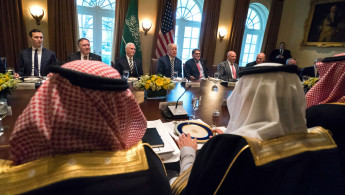US should help 'oblivious' Saudis exit Yemen war: study
The kingdom's stalwart ally should appoint a special envoy and suspend most arms shipments to the Saudis with a promise to resume them once the kingdom ends its four-year offensive against Houthi rebels, which has left thousands of civilians dead, the group, which researches ways to end conflicts, suggested.
The Saudi-led coalition "needs to stop thinking about how to eke out some notional victory and instead commit itself wholly to finding a political exit, regardless of whether that means empowering the Houthis more than it is comfortable with in the short term", the group said in a study based on interviews with current and former officials in the US and elsewhere.
"The US should lead the way by finding its own exit," it said.
The report comes after Congress - alarmed by persistent civilian casualties and widespread hunger in Yemen, as well as Saudi Arabia's killing of US-based writer Jamal Khashoggi - voted to cut off US support to the war effort.
President Donald Trump, who has closely allied himself with Saudi Arabia, has threatened to veto the bill but has not yet done so.
Democratic Senator Chris Murphy, a leading critic of the Yemen war, said that even if Trump goes ahead with his veto, Congress can serve as a "bad cop" to pressure Saudi Arabia to change course.
"This is not a question of whether or not the coalition is going to defeat the Houthis; that question has been answered," Murphy told a briefing on the report.
"The Houthis are going to play a substantial and significant role in the future governance of Yemen, so it is a matter of deciding how the Saudis will live with that in a way that doesn't threaten their long-term security interests."
Trump has sided with the Saudis in part because they say they are trying to prevent a victory by rival Iran, which has supported the rebels who share religious kinship with the Shia clerical regime in Tehran.
But the International Crisis Group (ICG) said the calculation was reversed, with Iran in fact benefiting the longer the conflict persists, with the Saudis sapped of resources and reputation at a minimal investment by Tehran.
"I think they see that they need to end it (but) they don't know how to end it," Robert Malley, the group's president, said of the Saudis.
The Saudis keep thinking "a little more military power and the Houthis will crack and then we'll be able to end the war and Iran will be on its backfoot," he said.
"But we have four years of evidence to disprove that."
US President Donald Trump and Saudi Arabia's Crown Prince Mohammed bin Salman discussed human rights and regional issues over the phone, the White House claimed last week, amid accusations Washington is turning a blind eye to Saudi abuses.
The two leaders were said to have spoken about Riyadh’s role in Middle East stability, maintaining pressure on Iran as well as 'the importance of human rights issues'.
US lawmakers have called on President Trump to harden its stance towards Saudi Arabia but Trump has been ignoring these calls saying the partnership with the kingdom is important for the US economy as well as for maintaining stability in the region.
Follow us on Twitter: @The_NewArab





 Follow the Middle East's top stories in English at The New Arab on Google News
Follow the Middle East's top stories in English at The New Arab on Google News
![Both Hamas and the Palestinian Authority welcomed the ICC arrest warrants [Getty]](/sites/default/files/styles/image_330x185/public/2024-11/GettyImages-2178351173.jpg?h=199d8c1f&itok=TV858iVg)

